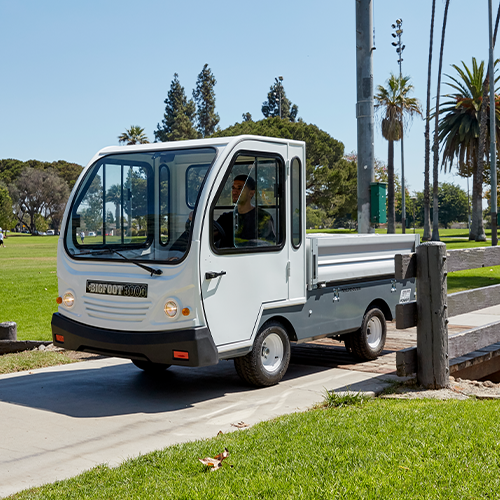The transportation industry is going through a big transformation, with electric vehicles (EVs) leading the charge towards a more sustainable and efficient future.
At Industrial Vehicles, we believe in the potential of electric industrial vehicles to revolutionise the way businesses operate.
Let’s dive into what electric vehicles are, how they work, their history, advantages, and the types available in the market. Also, find out what EVs mean for our future and why you should consider investing in them for your business.
What Are Electric Vehicles?
Electric vehicles, commonly known as EVs, are powered entirely or partially by electricity. Unlike traditional vehicles that rely on internal combustion engines (ICEs) running on petrol or diesel, EVs use electric motors powered by rechargeable batteries.
This shift from fossil fuels to electricity is a crucial step in reducing greenhouse gas emissions and minimising the environmental impact of transportation.
How Do Electric Vehicles Work?
At the heart of an electric vehicle is its battery pack, which stores the energy needed to power the electric motor.
When the vehicle is in operation, the battery supplies electricity to the motor, which in turn drives the wheels.
The vehicle’s onboard systems manage the flow of electricity, ensuring smooth acceleration and efficient energy use.
When the battery is depleted, it can be recharged by plugging the vehicle into a power source, such as a home charging station or a public charging point.
There are different types of electric vehicles, including:
- Battery Electric Vehicles (BEVs): These EVs run exclusively on electricity and have no internal combustion engine.
- Plug-in Hybrid Electric Vehicles (PHEVs): These have both an electric motor and an internal combustion engine. They can be charged from an external power source and can run on either electricity or petrol.
- Hybrid Electric Vehicles (HEVs): These combine a conventional engine with an electric propulsion system, but cannot be charged externally; they rely on regenerative braking and the internal combustion engine to recharge the battery.
A Brief History of Electric Vehicles
The idea of electric cars is older than you might believe. The first electric vehicles were developed in the late 19th century, long before the dominance of petrol-powered cars.
Early EVs were popular due to their ease of use, smooth operation, and lack of noise. However, the advent of the internal combustion engine and the mass production of affordable petrol vehicles by companies like Ford led to a decline in EV popularity.
It wasn’t until the late 20th century, with growing environmental concerns and advances in battery technology, that electric vehicles began to make a resurgence. Today, EVs are once again at the forefront of the automotive industry, with manufacturers and consumers alike recognising their potential to reduce carbon emissions and combat climate change.
Advantages of Electric Vehicles
Electric vehicles offer many benefits, particularly in industrial settings where efficiency and sustainability are paramount:
- Environmental Benefits: EVs produce zero tailpipe emissions, reducing air pollution and contributing to cleaner cities and workplaces.
- Lower Operating Costs: Electricity is generally cheaper than petrol or diesel, and EVs have fewer moving parts, which translates to lower maintenance costs.
- Quiet Operation: Electric motors are quieter than internal combustion engines, reducing noise pollution and creating a more pleasant working environment.
- Instant Torque: EVs deliver power to the wheels instantly, resulting in faster acceleration and more responsive handling, which is particularly beneficial for industrial uses.
- Energy Efficiency: EVs are more energy-efficient than traditional vehicles, as they convert a higher percentage of the energy from their batteries into motion.
What Electric Vehicles Mean for Our Future
The rise of electric vehicles marks a significant shift in the transportation industry. With the push for clean energy, electric vehicles are set to be the future of transportation. For businesses, this shift presents an opportunity to reduce operational costs, minimise environmental impact, and enhance corporate sustainability efforts.
In industrial settings, electric vehicles are particularly promising. Their low operating costs, combined with the ability to operate indoors without emitting harmful gases, make them ideal for warehouses, factories, and even hotels and resorts.
Conclusion
Electric vehicles are more than just a trend—they are the future of transportation. With their numerous advantages and potential for growth, investing in an electric industrial vehicle is a smart move for any business.
At Industrial Vehicles, we offer a wide range of electric vehicles designed to meet the demands of modern industry. Explore our selection today and take the first step towards a more sustainable and efficient future.





